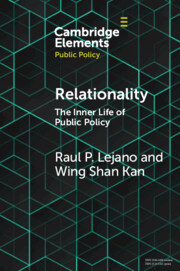Policy is ostensibly crafted upon an overarching notion of rationality, in the form of rules, roles and designs. However, sometimes policy deviates from formal templates and seems to be guided by a different governing ethic. Rather than categorising these as policy anomalies, we can understand them as the workings of what we will refer to as a relational model of policy. The relational model describes how policy outcomes emerge from the working and reworking of relationships among policy actors. We define relationality and develop its use in policy research. While the relational can be depicted as an alternative model for policy (e.g., Confucian versus Weberian), it is more accurate to understand it as a system that complements conventional policy regimes. To illustrate the concept, we examine examples from policymaking in China. We end with a discussion of how relationality should be a general condition that should be applicable to many, if not all, policy situations.
